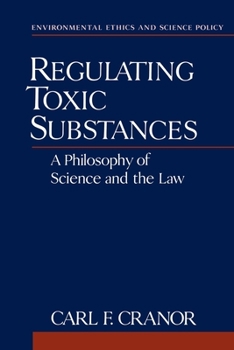Regulating Toxic Substances: A Philosophy of Science and the Law
Select Format
Select Condition 
Book Overview
The proliferation of chemical substances in commerce poses scientific and philosophical problems. The scientific challenge is to develop data, methodologies, and techniques for identifying and assessing toxic substances before they cause harm to human beings and the environment. The philosophical problem is how much scientific information we should demand for this task consistent with other social goals we might have. In this book, Cranor utilizes material from ethics, philosophy of law, epidemiology, tort law, regulatory law, and risk assessment, to argue that the scientific evidential standards used in tort law and administrative law to control toxics ought to be evaluated with the purposes of the law in mind. Demanding too much for this purpose will slow the evaluation and lead to an excess of toxic substances left unidentified and unassessed, thus leaving the public at risk. Demanding too little may impose other costs. An appropriate balance between these social concerns must be found. Justice requires we use evidentiary standards more appropriate to the legal institutions in question and resist the temptation to demand the most intensive scientific evaluation of each substance subject to legal action.
Format:Paperback
Language:English
ISBN:0195113780
ISBN13:9780195113785
Release Date:August 1997
Publisher:Oxford University Press
Length:272 Pages
Weight:1.00 lbs.
Dimensions:0.8" x 6.2" x 9.2"
Related Subjects
Chemistry Democracy Earth Sciences Engineering Environmental Engineering Environmental Science Environmental Studies History & Philosophy History & Surveys Ideologies & Doctrines Philosophy Political Ideologies Political Science Politics & Government Politics & Social Sciences Safety Science Science & Math Science & Scientists Science & Technology TechnologyCustomer Reviews
1 rating
Regulating Toxic Substances: A Philosophy of Science and the Law
Published by Thriftbooks.com User , 18 years ago
Regulating Toxic Substances: A Philosophy of Science and the Law provides a sophisticated and educational analysis of the complexities associated with regulating, assessing and conceptualizing toxic substances. Cranor does an impressive job at dissecting and disentangling the perplexing relationship between scientific risk assessment analysis as it pertains to Tort law, regulatory agencies and their epistemic and philosophical considerations. Theories of distribution and variants of Rawls's concept of Utilitarianism provide an atypical way of conceptualizing ethical justifications for the regulation of carcinogens and other toxic substances. The universal consideration taken by Cranor is the relationship between scientific assessment of toxic substances and public-healthcare policy efficiency. Of particular value, the last four appendices discuss the theoretic and scientific cancer potency estimates in the California Department of Health Sciences (CDHS) and the Environmental Protection Agency (EPA). Models of risk act as a function of Alpha and Beta values, statutes authorizing the regulation of carcinogens, and derivation of TD50 (tumorigenic dose) potency values. Regulating Toxic Substances: A Philosophy of Science and the Law will be best suited for those who are interested in the toxic Tort litigation and familiar with moderate to advanced statistic models of risk assessment and public-healthcare policy. Clanor puts together a cohesive evaluation of the synergetic relationship between toxic substances, policy and scientific method.






